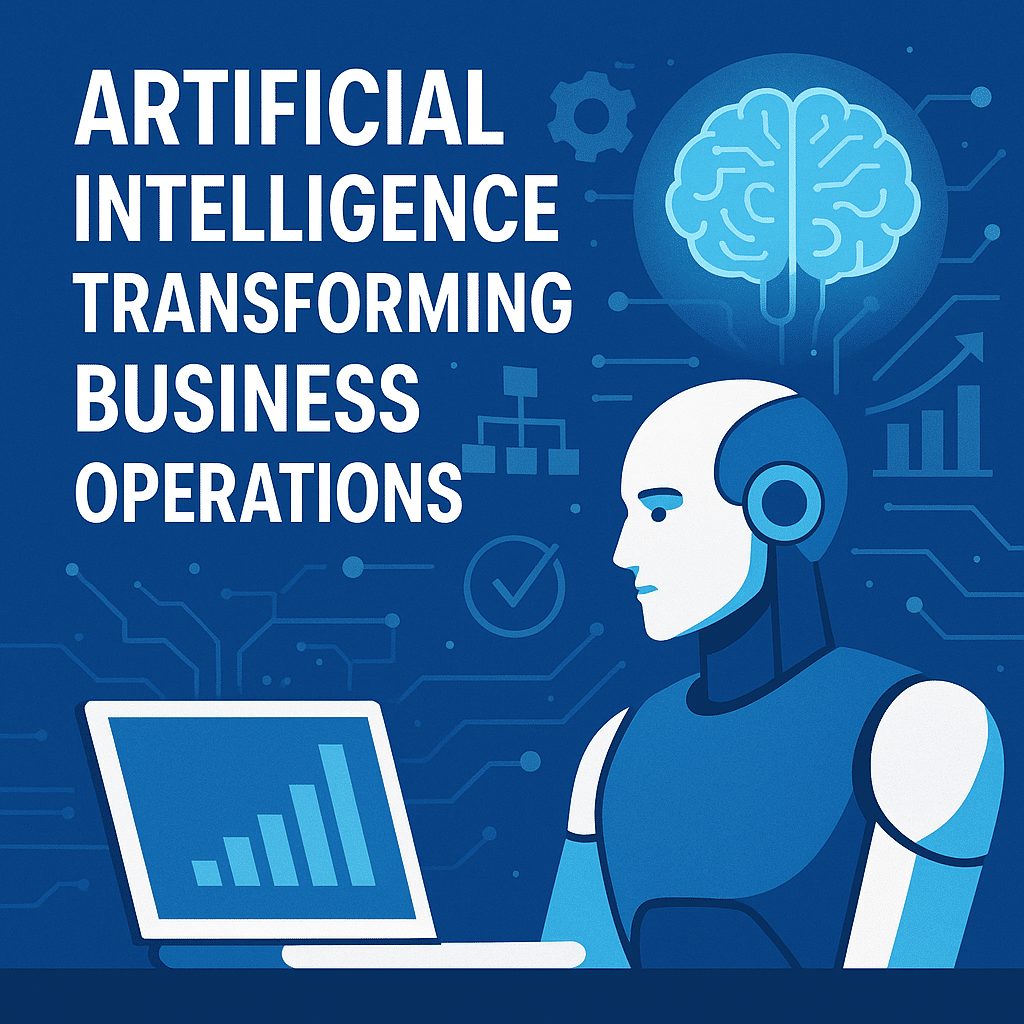Artificial intelligence is revolutionizing the landscape of business operations, offering unprecedented opportunities for innovation and efficiency. From streamlining processes to enhancing decision-making through advanced data analytics, the impact of AI is profound and far-reaching.
As business professionals, entrepreneurs, and technology enthusiasts navigate this rapidly evolving terrain, the integration of AI technology becomes an essential consideration for future growth and competitiveness.
In this article, we will delve into how AI in business is transforming industries, driving automation, and shaping the future of business through advancements in machine learning and predictive analytics.
Join us as we explore the dynamic role of artificial intelligence in reshaping the way companies operate and thrive in a digital age.
Introduction to AI in Business
Artificial Intelligence (AI) has become a cornerstone of modern business operations, revolutionizing how companies function and compete. This section explores the fundamentals of AI, its historical development, and current trends shaping the business landscape.
Defining Artificial Intelligence
Artificial Intelligence refers to the simulation of human intelligence in machines programmed to think and learn like humans. In business contexts, AI encompasses a range of technologies that enable computers to perform tasks typically requiring human intelligence.
AI systems can analyze vast amounts of data, recognize patterns, and make decisions with minimal human intervention. This capability has profound implications for business efficiency and innovation.
From natural language processing to computer vision, AI technologies are diverse and continuously evolving, offering businesses new ways to solve complex problems and create value.

Historical Context and Evolution
The concept of AI dates back to the 1950s, but its practical applications in business have only recently become widespread. Early AI systems were rule-based and limited in scope.
The advent of more powerful computing and the explosion of available data in the 1990s and 2000s led to significant advancements in AI capabilities. Machine learning algorithms, in particular, have driven much of the recent progress in AI.
Today, AI is no longer confined to research labs or tech giants. Businesses of all sizes are leveraging AI to gain competitive advantages, from startups using AI to disrupt traditional industries to established corporations integrating AI into their core operations.
Current Trends in AI Technology
-
Deep Learning: Advanced neural networks capable of processing unstructured data like images and text.
-
Natural Language Processing: AI systems that can understand and generate human language, powering chatbots and virtual assistants.
-
Robotic Process Automation: AI-driven software robots that can perform repetitive tasks with high accuracy.
These trends are reshaping business processes across industries. For example, financial institutions use AI for fraud detection, while retailers employ AI for personalized marketing and inventory management.
As AI continues to evolve, we’re seeing increased focus on explainable AI, which aims to make AI decision-making processes more transparent and understandable to humans.
Impact of AI on Business Operations
AI is fundamentally changing how businesses operate, from automating routine tasks to informing strategic decisions. This section examines the transformative effects of AI on various aspects of business operations.
Enhancing Efficiency through Automation
AI-driven automation is revolutionizing business efficiency by taking over repetitive, time-consuming tasks. This allows human workers to focus on more complex, creative, and strategic activities.
In manufacturing, AI-powered robots work alongside humans, handling precision tasks and improving production speed. These systems can operate 24/7, significantly increasing output while maintaining consistent quality.
For administrative tasks, AI chatbots and virtual assistants are handling customer inquiries, scheduling meetings, and managing email communications. This not only reduces workload but also improves response times and customer satisfaction.
AI-Driven Decision Making
AI is transforming decision-making processes by providing data-driven insights and predictive analytics. This enables businesses to make more informed and timely decisions.
Machine learning algorithms can analyze vast amounts of historical data to identify patterns and trends, helping predict future outcomes. This is particularly valuable in areas like financial forecasting and risk assessment.
AI systems can also process real-time data from various sources, providing up-to-the-minute insights that allow businesses to respond quickly to changing market conditions or customer behaviors.
Transforming Customer Experiences
AI is revolutionizing how businesses interact with and understand their customers. Personalization, powered by AI, is becoming the norm in customer experiences.
AI algorithms analyze customer data to predict preferences and behaviors, allowing businesses to tailor their products, services, and marketing efforts to individual customers. This leads to more relevant and engaging customer interactions.
In e-commerce, AI-powered recommendation engines suggest products based on browsing history and purchase patterns, increasing sales and customer satisfaction. Similarly, in content streaming services, AI curates personalized playlists and viewing recommendations.
Data Analytics and Machine Learning
The synergy between data analytics and machine learning is driving unprecedented insights and predictive capabilities in business. This section explores how these technologies are being leveraged to inform strategy and decision-making.
Leveraging Data for Insights
In the digital age, businesses generate vast amounts of data. AI and machine learning technologies are essential tools for extracting meaningful insights from this data deluge.
Advanced analytics powered by AI can process structured and unstructured data from diverse sources, uncovering patterns and correlations that humans might miss. This leads to deeper understanding of business operations, market trends, and customer behaviors.
For example, retail businesses use AI to analyze sales data, foot traffic patterns, and external factors like weather to optimize inventory and staffing levels. This data-driven approach leads to more efficient operations and improved customer satisfaction.
Machine Learning in Business Strategies
Machine learning algorithms are increasingly central to business strategy formulation and execution. These systems can learn from historical data and adapt to new information, continuously improving their performance.
In marketing, machine learning models analyze customer data to segment audiences more effectively, predict customer lifetime value, and optimize ad targeting. This leads to more efficient marketing spend and higher conversion rates.
Financial institutions use machine learning for credit scoring, fraud detection, and algorithmic trading. These applications not only improve accuracy but also process vast amounts of data in real-time, enabling faster decision-making.
Predictive Analytics and Forecasting
Predictive analytics, powered by AI and machine learning, is transforming how businesses plan for the future. These tools can forecast trends, demand, and potential risks with unprecedented accuracy.
In supply chain management, predictive analytics helps businesses anticipate demand fluctuations, optimize inventory levels, and identify potential disruptions before they occur. This leads to more resilient and efficient supply chains.
For human resources, predictive analytics can forecast employee turnover, helping businesses proactively address retention issues. It can also assist in identifying high-potential candidates during the recruitment process.
Challenges and Considerations
While AI offers immense potential, its implementation comes with significant challenges. This section examines the ethical, privacy, and workforce implications of AI adoption in business.
Ethical Implications of AI
As AI systems become more autonomous and influential in decision-making, ethical considerations come to the forefront. Businesses must navigate complex moral questions surrounding AI use.
One key concern is algorithmic bias. AI systems can inadvertently perpetuate or amplify existing biases present in their training data, leading to unfair or discriminatory outcomes. Businesses must actively work to identify and mitigate these biases.
Transparency and accountability in AI decision-making are also crucial ethical considerations. As AI systems make decisions that impact people’s lives, there’s a growing demand for explainable AI that can provide clear rationales for its conclusions.
Navigating Data Privacy Concerns
AI systems rely on vast amounts of data, often including sensitive personal information. This raises significant privacy concerns that businesses must address.
Compliance with data protection regulations like GDPR is essential. Businesses must ensure they have proper consent for data use and implement robust data security measures to protect against breaches.
Balancing the benefits of personalization with privacy concerns is an ongoing challenge. Businesses must find ways to leverage data for improved customer experiences while respecting individual privacy rights.
Skills and Workforce Adaptation
The rise of AI is reshaping the job market, creating both challenges and opportunities for the workforce. Businesses must manage this transition carefully.
While AI automates certain tasks, it also creates new roles and increases demand for skills in areas like data science, AI engineering, and ethical AI governance. Businesses need to invest in reskilling and upskilling their workforce to meet these new demands.
There’s also a growing need for employees who can work alongside AI systems, interpreting and acting on AI-generated insights. This human-AI collaboration will be key to maximizing the benefits of AI in business.
The Future of Business with AI
As AI continues to evolve, its impact on business is set to grow exponentially. This section looks at emerging innovations, strategies for AI integration, and how businesses can prepare for an AI-driven future.
Innovations on the Horizon
The field of AI is rapidly advancing, with new technologies promising to further transform business operations. Some key innovations to watch include:
-
Quantum AI: Combining quantum computing with AI could lead to unprecedented processing power, solving complex problems at incredible speeds.
-
Edge AI: AI processing on local devices rather than in the cloud, enabling faster, more private, and more reliable AI applications.
-
Generative AI: AI systems that can create new content, from art to product designs, opening up new possibilities for creativity and innovation.
These emerging technologies have the potential to disrupt industries and create new business models. Companies that stay abreast of these developments will be better positioned to leverage them for competitive advantage.
AI Integration Strategies
Successfully integrating AI into business operations requires a strategic approach. It’s not just about adopting the latest technology, but about aligning AI initiatives with business goals.
Key steps in AI integration include:
-
Identifying high-impact areas where AI can add value
-
Ensuring data readiness and quality
-
Building or acquiring necessary AI capabilities
-
Fostering a culture of AI adoption and continuous learning
Successful AI integration often involves starting with pilot projects, learning from the results, and scaling up gradually. This approach allows businesses to build expertise and confidence in AI implementation.
Preparing for the AI-Driven Future
As AI becomes increasingly central to business operations, companies must prepare for a future where AI is ubiquitous. This preparation involves several key areas:
-
Workforce Development: Investing in AI literacy across the organization and developing specialized AI talent.
-
Ethical Framework: Establishing clear guidelines for ethical AI use and decision-making.
-
Infrastructure: Building flexible, scalable IT infrastructure capable of supporting advanced AI applications.
-
Data Strategy: Developing comprehensive strategies for data collection, management, and governance.
Businesses that proactively prepare for the AI-driven future will be better positioned to thrive in an increasingly competitive and technology-driven business landscape. The key is to view AI not just as a tool, but as a fundamental shift in how business is conducted.




